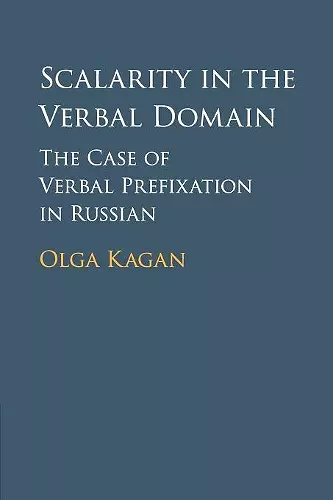Scalarity in the Verbal Domain
The Case of Verbal Prefixation in Russian
Format:Paperback
Publisher:Cambridge University Press
Published:28th Mar '19
Currently unavailable, and unfortunately no date known when it will be back
This paperback is available in another edition too:
- Hardback£100.00(9781107092624)

Proposes a new analytical approach to the semantics of Russian verbal prefixes, using modern theoretical tools to explore wide-ranging data.
Olga Kagan presents a new unified analysis of Russian verbal prefixes which combines a formal semantic approach with detailed discussion of data. In doing so, she sheds light on an intricate and puzzling phenomenon which is of interest to linguists working across a wide range of fields.Verbal prefixes in Slavic languages remain an intricate and puzzling phenomenon, raising questions about whether their behavior is governed by a systematic pattern, and if their attachment is subject to any kind of uniform semantic system. Olga Kagan offers a new unified analysis of Russian verbal prefixes which combines a formal semantic approach with detailed discussion of data. The book addresses two vital issues, both of which play an important role in modern linguistic research: the role of scalarity in natural language and, more specifically, within the verbal domain; and Slavic verbal prefixation. Accessibly written and illustrated with numerous examples, Scalarity in the Verbal Domain is important reading for researchers and students of formal semantics, cognitive linguistics and Slavic languages.
'The scale hypothesis brings new life into the perennial discussion of whether it is possible to assign verbal prefixes with a uniform meaning despite their apparent polysemy. Kagan succeeds with her scalar approach in formulating a precise semantics for various prefixes in Russian. This important contribution to the field will certainly shape the discussion among semanticists and Slavicists alike in the years to come.' Atle Grønn, Universitetet i Oslo
'Most noticeably, the monograph is written in a clear, accessible language, it is perfectly structured, and the argumentation is thorough and transparent. The work is based on two semantic approaches: formal and cognitive. This makes the potential audience of the book fairly large and versatile.' Eugenia Romanova, The Linguist List (linguistlist.org)
ISBN: 9781107465893
Dimensions: 230mm x 153mm x 20mm
Weight: 450g
276 pages